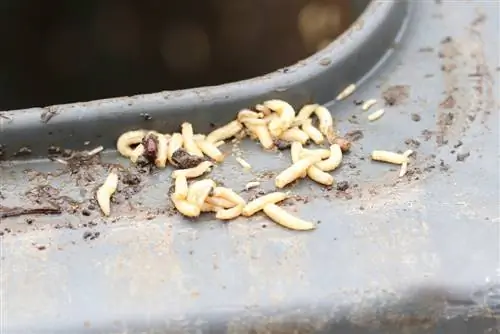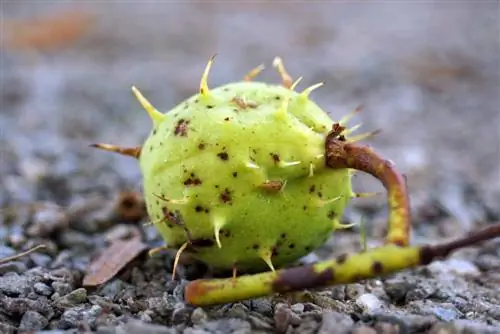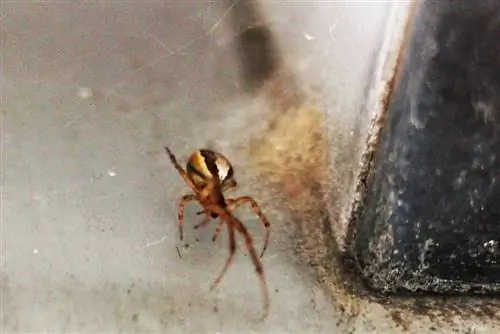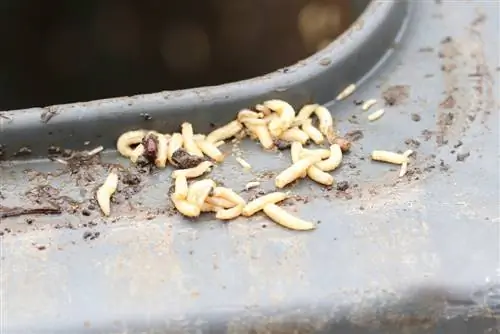- Author admin caroline@plants-knowledge.com.
- Public 2023-12-17 03:39.
- Last modified 2025-01-24 12:45.
Small, white and yucky: Maggots are a real nightmare, especially in the kitchen, even though the maggots themselves don't affect kitchen hygiene in the slightest. Mother fly didn't come into the kitchen to lay her eggs because the kitchen was unclean, but because food is processed in kitchens. That's why you get rid of the maggots in no time; but you may need to rearrange the household a bit if you want to avoid repeat visits. The article lists the possible and sensible measures.
Where do the maggots come from?
Maggots are descendants of insects that crawl out of the eggs of flies. Some flies are very quick at laying eggs, among other things, this “egg throwing” has e.g. B. the blowfly gets its name. But also because it prefers to lay its eggs on feces or carrion, which is why the thick, iridescent brummer is not the most common household fly (but it also lays eggs on protein-containing remains). The normal “household fly” is the house fly, which flies to all foods that contain butyric acid or sugar and lays eggs there; and the famous fruit flies can also lay eggs in households.
When females of all these flies get lost in the house and are in distress, they lay their eggs somewhere; shortly after laying their eggs, the maggots hatch. This is the reason why maggots in the house have nothing to do with uncleanliness, because flies often get into trouble laying.
Usually the mother fly tries to place the eggs in such a way that the maggots crawl out of the egg into the middle of a paradise of plant and animal matter that is currently decomposing - the children should have a good life and live like that the “maggots in bacon”. If the eggs are laid somewhere, the children don't have a good time and go on a journey to find something to eat; This is why maggots can appear in the most unlikely places in the house.
Maggots in the kitchen
Maggots in the kitchen can come from the flies mentioned above, then they can usually be found in garbage, pet food, and litter boxes. If the maggots are running around in other places in the kitchen, they can still be fly larvae, but they are often moth larvae (which are then called caterpillars because moths are butterflies).
These food moths and their caterpillars have slightly different preferences than visiting flies; instead of protein or sugar, they go for grains, spices and nuts, often through packaging or bought with the package. If you decide to structure your household a little more because of maggots, it makes no difference whether you are dealing with maggots or caterpillars. As you will read in the paragraph after next, it is about “turning lots of little screws” with an effect on many insects that want to move in.
Maggot infestation in the rest of the house
Maggots are not limited to the kitchen because flies are not limited to the kitchen either. They visit all places in the home where pets leave their traces, terrariums and aquariums and pantries where pet food and other organic accessories for people and pets are stored. And of course every trash can where organic remains have been thrown, side rooms where a fallen piece of food is waiting in a dark, damp place, the corner under the cupboard or floorboards where a mouse has died.
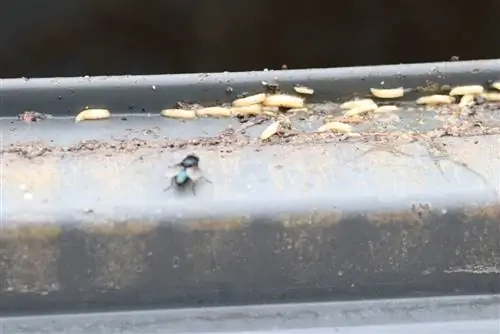
The bigger the house and the more nature on the doorstep, the more diverse the opportunities for a fly to find a suitable place to lay its eggs. And if she can't find it, she sometimes lays her eggs anyway because it's urgent time to do so (this is called laying distress). In the worst case scenario, she lays these eggs in a small crack in the floor of the attic, so that the maggots come towards you on the ceiling in the room below.
Fighting maggots
The maggots themselves can be quickly removed with garbage bags, pet food, etc. or with a dustpan (from which they can be disposed of directly into the garden as he althy bird food). Where they have walked around can be wiped, but more for a clean feeling, the maggots themselves do not carry large amounts of germs with them or in them.
It is more important to find the rotting food residue that encouraged the fly to lay its eggs, remove it and thoroughly clean the place where it was found. A little scent should definitely be sprayed here, because of the smell the fly chose this place to lay its eggs. In addition, site-specific changes in cleaning measures may be required so that “the last maggots remain”: no longer leave animal food out, clean out the rabbit hutch more often, etc., more suggestions in the next paragraph.
If you can't find the "nest of maggots" with the best will in the world, you should first assess the situation and then decide whether further steps are appropriate. If
- the stream of maggots dries up after a few days
- Due to the design of the house, it is unlikely that flies would create extensive nests in cracks in the building structure
- no unpleasant smell can be noticed near the maggots
- if the maggots emerge from a relatively clean environment, you can assume that a fly in need of laying has laid its eggs in an inappropriate place and the matter will change when the last maggot appears. B. completed on day 5.
If the maggots have developed into a side room in the middle of the last, not yet renovated, sinkhole, things look different, then it's time to finally clear the air here.
Preventing maggot infestation means fighting flies
Fighting flies is not limited to sporting rounds with the fly swatter, but rather it is about reducing the overall frequency of flies observed in the house. There are many small measures you can take to make your household a little less attractive to flies. There is no household without flies, but there are many households in which only a few flies fly around. Even if animals live in the household, even if there is a garden in front of the door. This is what your options look like:
Minimize fly attractants
In summer you are spared from accumulations of hungry flies if the windows at the place where food is prepared (juice preparation, jam filling, etc.) are closed.) are provided with fly screens. If there is heavy traffic through the front door to this room, an automatic door closer will help (a little). During the transitional period, windows in “foodless” living spaces should also be secured with fly screens if there are fly attractions near the apartment (restaurant garbage cans, dung heaps, pomace from cider factories).
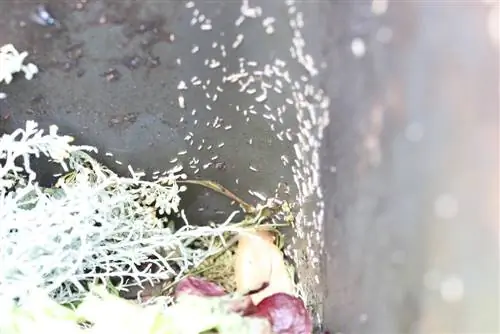
The fly attractions can also be located in your own home:
- Clean cat litter boxes and small animal enclosures regularly so that flies do not lay their brood on the feces
- Canned pet food is a mix of finely chopped food production residues that rot quickly, a culinary dream for flies
- The warmer it is, the faster other foods left open send clear odor messages
- Since cool pantries are rare these days, any food outside the refrigerator quickly becomes a fly attractant
- Flies can feel comfortable even in super clean households
- for example, because the fruit plate, dirty dishes, half-full pots are left open or in the half-full dishwasher
- (raw) meat waste ends up in a rarely emptied organic waste bin without first being wrapped in newspaper
- Smells in the organic waste bin can be avoided by adding a few drops of orange oil, tea tree oil, vinegar or s alt solution
- Purchasable organic bin powder, rock dust or slaked lime from the hardware store can help against the development of maggots
- immediate use of organic waste, e.g. B. as plant fertilizer
- skillful organic waste bin management: layers of newspaper between the waste absorb moisture
- Wood chips, coconut fibers can also do this, no foul gases or fungi form in a dry bin
- In some cities, an odor-reducing lid filter for the organic waste bin is offered for an additional charge (20 - 40 euros)
- Free hygiene guarantees immediate disposal of organic waste into the compost
- If you often have to deal with flies/maggots, you should check what you have in stock: no bags or foil, but glass, solid plastic, metal
You could use the maggots as an opportunity to go through your supplies and announce (and carry out) the “eating weeks”, otherwise it won't help. You'll have reached your goal when there's only enough supplies left so that everything can be packed maggot-proof (which takes up more space than the collection of bags squeezed into the cupboard). Don't immediately fill half-empty pantry shelves to bursting point, we don't live in a shortage of provisions, and the supposedly cheap offers a) keep coming and b) save a few cents, if at all. In fact, they save nothing at all, on the contrary, they usually only increase the proportion of food that is still disposed of in its packaging. Realize that pantries need to be sparsely stocked if they are to be cleaned as part of the normal daily kitchen cleaning because no one is clearing out pantries to clean them every day. Wiping through on the side is no problem if the content can simply be pushed to the side.
If more food is thrown away in a household than consumed, the purchasing realities should be adapted to the consumption realities. Tastes change and we are all too busy to pay constant attention to our eating habits. Tasty foods that are satisfying to eat are eaten and not thrown away.
Typical supply traps
If something should always be there because it is so he althy, but no member of the household actually likes to eat it, it will not be eaten and does not need to be bought. If something should always be there because it is so terribly tasty, but is actually so difficult to prepare that there is never anyone to take on the complicated preparation, then it will not be prepared and does not need to be bought.
A little digression
With the bacon the maggot has not yet reached the store shelves, but with the cheese it has: it is sold and eaten with the Sardinian maggot cheese “Casu Marzu”; In this case, “Made in Italy” also means: “Made made the Cheese”. Maggots, which populate the first gourmet restaurants as a substitute for beef, Saxon mite cheese and French mimolette with maggot bark will not be discussed in detail for unprepared readers; And no one has to taste all of this - but it proves that maggots actually don't deserve their disgusting image. In fact, they secrete so many antibacterial substances that they are used medically for human wounds that heal poorly, so maggots do not cause any hygienic problems.
Get the household going a little?
Is often not necessary and doesn't always work immediately, e.g. B. because the time of maggot infestation is also a time of busy work. But every few years every household needs some kind of basic maintenance. This doesn't mean spring cleaning; we really wouldn't dare accuse you of any kind of uncleanliness. It's more about attention, about "a few tugs" to finally throw out the clutter in the corner (not that clutter attracts maggots, it's just part of the head and household ventilation); to actually replace the kitchen cupboard that you can't clean under with something that is easier to clean (which can also be purchased for a few euros via a classified ad); actually open the windows in the whole house for five minutes a day (can be incorporated into your morning Pilates exercise), and so on.
Getting the household up to speed also includes various small repairs in your own home. These small repairs in particular often have to do with small cracks and crevices in which a mother fly lays her eggs if she accidentally gets lost in the house.
Anti-fly fragrance (that pleases people)
When it comes to smells, flies have practical preferences - they like exactly what we don't like, one of the things they are there for is to get rid of all those unpleasant residues such as feces, carrion, etc.
So people can use plenty of anti-fly scent in and around the house, which only makes the human world more beautiful. People have been annoyed by too many flies in the house for a long time and have tried out a lot of scents, so we now have a pretty good overview of which scents flies usually don't like: Wiping with vinegar destroys odors and bacteria, peppermint or lavender oil evaporates (on the stove, in the mini smoker) keeps flies away and makes people more relaxed. Bay leaf oil in small bowls/wide-mouth bottles with a little water is said to repel many types of vermin.

As houseplants, Indian frankincense (Plectranthus coleoides) and eucalyptus trees (Eucalyptus globulus has the strongest scent) are said to repel flies; As balcony plants, geraniums and marigolds deter flies; in the kitchen, fresh basil should always have a “fly-phobic smell”. In the garden, the bed in front of the house can be planted with tomatoes, runner beans, nasturtiums, catnip, lavender, peppermint; these plants secrete scents that most flies don't like (and, apart from the vegetables, they also provide material for scented sachets, which then… again keep flies out of the house). Exceptions prove the rule even with flies, but you can experiment with whatever scents you and your family like.
Mechanical Defense
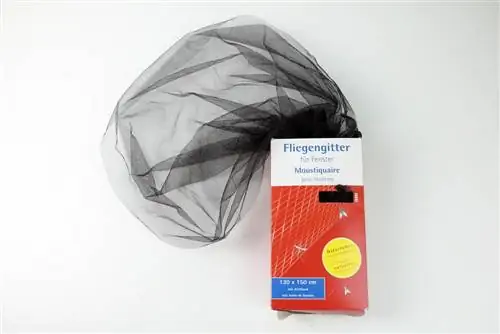
Think of the good old fly screens, gradually installed on all doors and windows, they help noticeably, especially in warm weather. Even the well-known adhesive strips are not completely “out” yet, but they noticeably relieve the “fly collection points” in the household. The good old fly swatter still does what it's supposed to do, especially when it's readily available in many places around the house.
Fly paradise in the back of the garden please
If a garden pond or water pond, then a little further back in the garden, where all the flies in the world can gather in “fly-heavy weather”. On the other hand, permanently damp areas near the house should be avoided.
Let natural enemy live
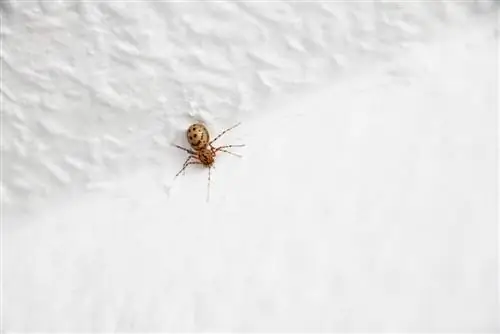
Spiders are powerful natural enemies of spiders that will build large traps in your way. If you are one of the lucky people who have not developed a fear of spiders, feel free to let the spiders live in your house. They are very useful housemates, ridding our living spaces of a whole range of insects; and if there are too many of them, they are simply thrown out into the open, and debris such as cobwebs disappear in the vacuum cleaner.
Chemical Control Agents
There are of course also anti-flies options, but they cannot be recommended for use in living spaces. They are also toxic to residents and can accumulate and accumulate in living spaces until the indoor air becomes quite toxic.
Biological defense
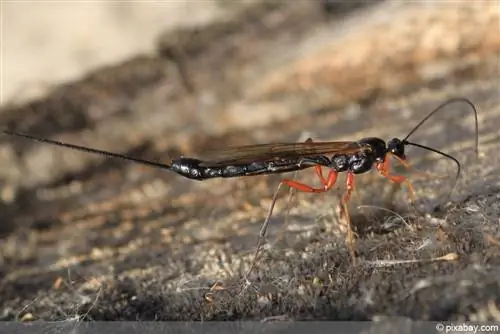
If flies become overwhelming, you can use parasitic wasps, which act as natural enemies and keep fly populations permanently in check. Parasitic wasps are available to buy; They are only a few millimeters in size, completely harmless to humans and pets and die when they have destroyed all the flies.

